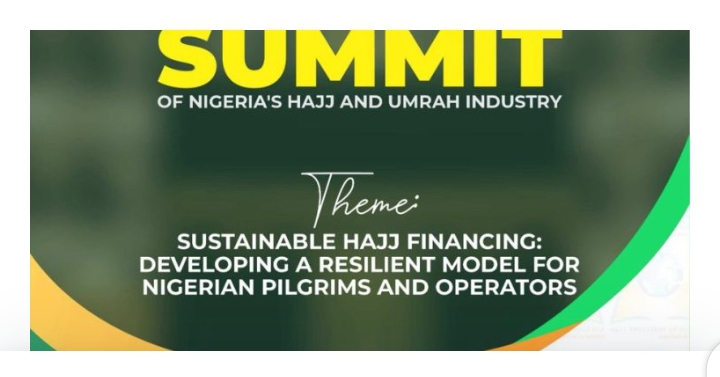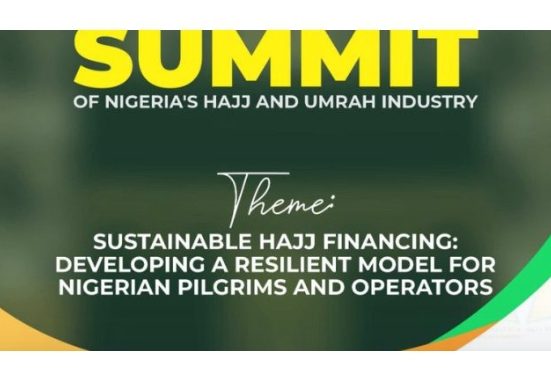As the sacred obligation of Hajj continues to beckon millions of devout Muslims across the globe, Nigeria remains one of the largest contributors to the annual pilgrimage to the Kingdom of Saudi Arabia. However, behind the scenes of this profound spiritual journey lies a complex web of financial, administrative, and logistical undertakings—one that demands innovation and foresight, especially in the face of evolving global realities. To address these challenges and create a more resilient framework for future Hajj operations, the National Hajj Commission of Nigeria (NAHCON) is set to convene the second edition of the National Hajj Stakeholders Summit.
Slated for Tuesday, April 30, 2025, at the NICON Luxury Hotel in Abuja, the one-day summit is expected to run from 9:00 a.m. to 6:00 p.m. with the theme, “Sustainable Hajj Financing: Developing a Resilient Model for Nigerian Pilgrims and Operators.” The event will bring together seasoned policymakers, financial experts, private sector players, and religious stakeholders in three thought-provoking panel sessions aimed at reshaping the financial backbone of Hajj administration in Nigeria.
Globally, the Hajj sector has not been spared from the ripple effects of economic shifts, rising service charges, fluctuating exchange rates, and stricter international regulations. Nigerian pilgrims, in particular, have felt the brunt of these pressures, with costs increasing steadily over the years. In light of this, the summit offers a crucial platform to brainstorm lasting solutions that will not only ensure affordability but also bolster the integrity and transparency of Hajj operations in the country.
At the heart of NAHCON’s vision is the creation of a self-sustaining Hajj industry, especially as government financial subventions continue to reduce in line with the recognition that Hajj is a personal religious duty and not a state-sponsored affair. To that end, the summit aims to deepen collaborative efforts between government institutions, Islamic financial service providers, and technology-driven firms to design systems that are both efficient and accessible.
Already, NAHCON has taken significant steps in this direction with the introduction and expansion of the Hajj Savings Scheme (HSS). Initially launched in collaboration with Jaiz Bank, the initiative has recently welcomed three other key players in Islamic finance—Lotus Bank, TAJ Bank, and The Alternative Bank. The growing network of partners is expected to further strengthen the scheme’s nationwide reach and enhance service delivery for intending pilgrims.
The Hajj Savings Scheme represents a pivotal shift in the country’s Hajj financing strategy. It promotes a culture of financial discipline among prospective pilgrims, allowing them to save gradually over time. More importantly, it empowers the commission to pool funds and invest in Shari’ah-compliant ventures, the returns from which are used to subsidize Hajj expenses. This innovative approach not only shields pilgrims from the harsh effects of exchange rate volatility but also allows for early logistical arrangements, resulting in lower overall costs and improved service standards.
With better planning made possible through the HSS, NAHCON is positioned to negotiate accommodation, feeding, and transportation packages well ahead of the Hajj season, locking in favorable rates and avoiding the inflated costs that often accompany last-minute arrangements. It is a win-win for both the pilgrims and the operators, and a step towards achieving sustainable pilgrimage management in Nigeria.
The upcoming summit is therefore not just a conference—it is a clarion call for collective action. Under the leadership of Professor Abdullahi Saleh Usman, the Chairman and CEO of NAHCON, the commission is reaffirming its commitment to reforming the Hajj system and ensuring that no Nigerian Muslim is left behind due to financial constraints. The goal is to protect the sanctity of Hajj while also preserving its viability as an economic and spiritual undertaking.
As the nation looks ahead to another Hajj season, all eyes will be on Abuja as stakeholders gather to deliberate on how best to steer Nigeria’s Hajj industry toward a future that is sustainable, inclusive, and responsive to both economic and spiritual realities.

